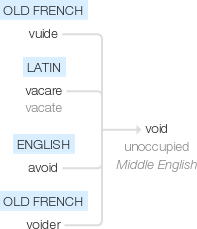Void
Middle English (in the sense ‘unoccupied’): from a dialect variant of Old French vuide ; related to Latin vacare ‘vacate’; the verb partly a shortening of avoid, reinforced by Old French voider .
wiktionary
From Middle English voide, voyde, from Old French vuit, voide, vuide (modern vide), in turn from a Vulgar Latin *vocitus, related to Latin vacuus(“empty”).
Alteration of voidee.
etymonline
void (adj.)
c. 1300, "unoccupied, vacant," from Anglo-French and Old French voide, viude "empty, vast, wide, hollow, waste, uncultivated, fallow," as a noun, "opening, hole; loss," from Latin vocivos "unoccupied, vacant," related to vacare "be empty," from PIE *wak-, extended form of root *eue- "to leave, abandon, give out." Meaning "lacking or wanting" (something) is recorded from early 15c. Meaning "legally invalid, without legal efficacy" is attested from mid-15c.
void (n.)
1610s, "unfilled space, gap," from void (adj.). Meaning "absolute empty space, vacuum" is from 1727.
void (v.)
"to clear" (some place, of something), c. 1300, from Anglo-French voider, Old French vuider "to empty, drain; to abandon, evacuate," from voide (see void (adj.)); meaning "to deprive (something) of legal validity" is attested from early 14c. Related: Voided; voiding.
